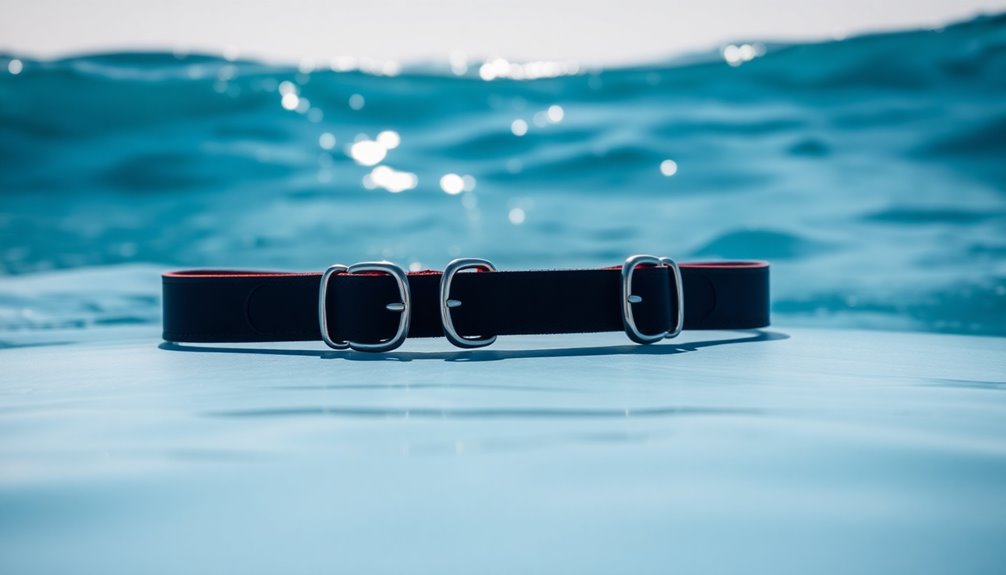Freedivers are amazing athletes who push themselves to incredible depths, often diving deeper than 214 meters! These elite competitors use different techniques, like holding onto a rope or swimming without fins, to explore the ocean's wonders. Famous freedivers, like Herbert Nitsch and Tanya Streeter, have set astonishing records, and to join their ranks, they train hard. They work on breath control, core strength, and even positive thinking to overcome challenges. It's vital for them to stay safe by never diving alone. Curious about what it takes to be a freediver or the competitions they join? There's plenty more to discover!
Key Takeaways
- Freedivers push human limits by achieving extraordinary depths, like Alexey Molchanov's 131 meters in Constant Weight Apnea, showcasing exceptional physical and mental capabilities.
- Various disciplines, such as Constant Weight and Dynamic Apnea, highlight the diverse skills and techniques elite freedivers employ to excel in their sport.
- Rigorous training, including breath control and core strength exercises, is essential for elite freedivers to overcome physical challenges encountered at extreme depths.
- Mental fortitude is crucial, with over 70% of freedivers facing performance anxiety, emphasizing the importance of psychological preparation in achieving peak performance.
- Major competitions like the AIDA World Championship and Vertical Blue provide platforms for elite athletes to challenge themselves and set new records in freediving.
Current Freediving Records
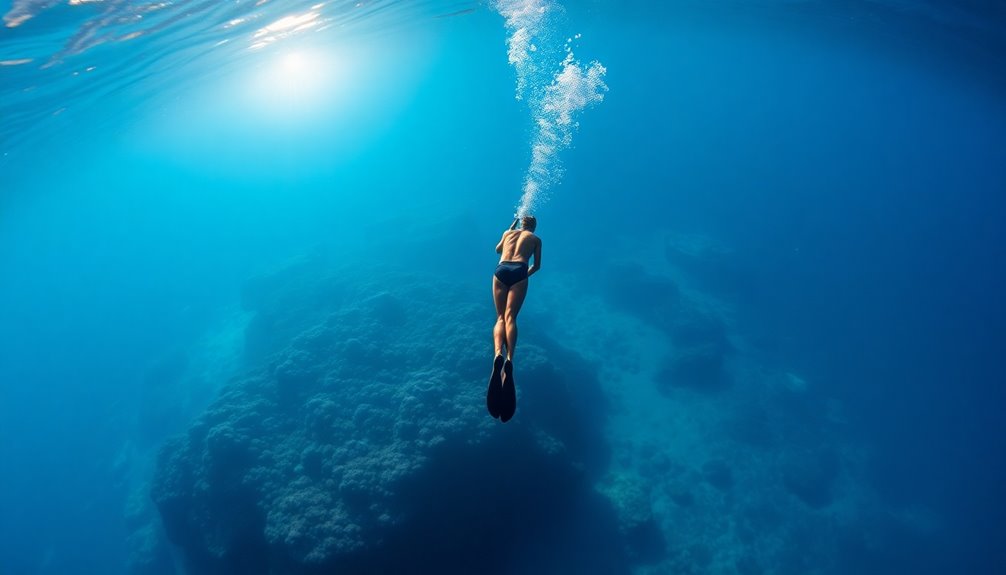
Exploring the depths of the ocean, freedivers push the boundaries of human capability with remarkable records that showcase their extraordinary skills. Each record tells a story of determination and courage.
For example, the men's Constant Weight Apnea record is an impressive 131 meters, set by Alexey Molchanov in 2021! Can you imagine diving that deep? Meanwhile, Alessia Zecchini holds the women's record at 123 meters, achieved in 2023.
But that's not all! In the world of Dynamic Apnea, Giorgos Panagiotakis and Mateusz Malina both swam an astonishing 300 meters in 2016. That's like swimming the length of three football fields without coming up for air! Notably, current records are available for all disciplines, demonstrating the continuous evolution of the sport.
When it comes to Free Immersion, Petar Klovar reached 128 meters in 2023, while the stately Branko Petrovic holds the men's Static Apnea record at a jaw-dropping 11 minutes and 54 seconds.
Freedivers like you can marvel at these incredible feats and maybe even feel inspired to take a deep breath and dive into the adventure of freediving yourself!
With each record, these athletes show us what's possible when we push our limits.
Various Freediving Disciplines
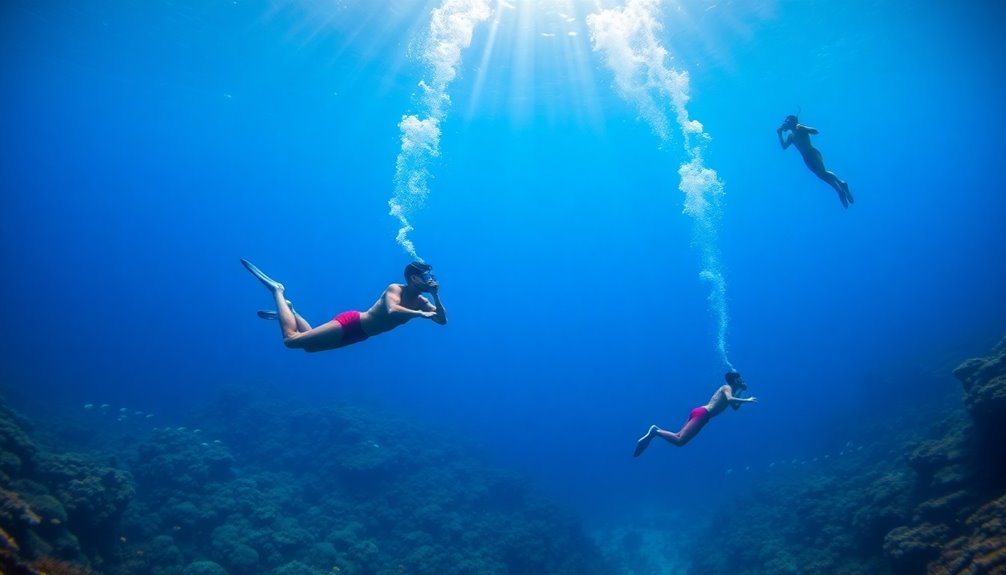
Freediving offers a variety of disciplines, each with unique techniques and challenges that test your skills and endurance.
For instance, in Constant Weight (CWT), you dive down using fins and a wetsuit, but you can't pull on ropes or change weights. It's super popular and often used by spear fishermen! The discipline emphasizes maintaining a constant weight throughout the dive.
If you want a challenge, try Constant Weight Without Fins (CNF), where you only use your muscles to swim down. It's tough but really rewarding!
Another fun option is Free Immersion (FIM), where you hold onto a guide rope to help you dive. This lets you focus on equalizing your ears while you go up and down.
If you're feeling adventurous, Variable Weight (VWT) lets you drop down with a sled and swim back up using your own strength!
In pools, you can enjoy Dynamic With Fins (DYN) or Dynamic Without Fins (DNF), racing horizontally to cover as much distance as possible.
And don't forget Static Apnea (STA), where you hold your breath for as long as you can while floating.
Each discipline is a chance to explore your limits and have a blast underwater!
Notable Freedivers in History
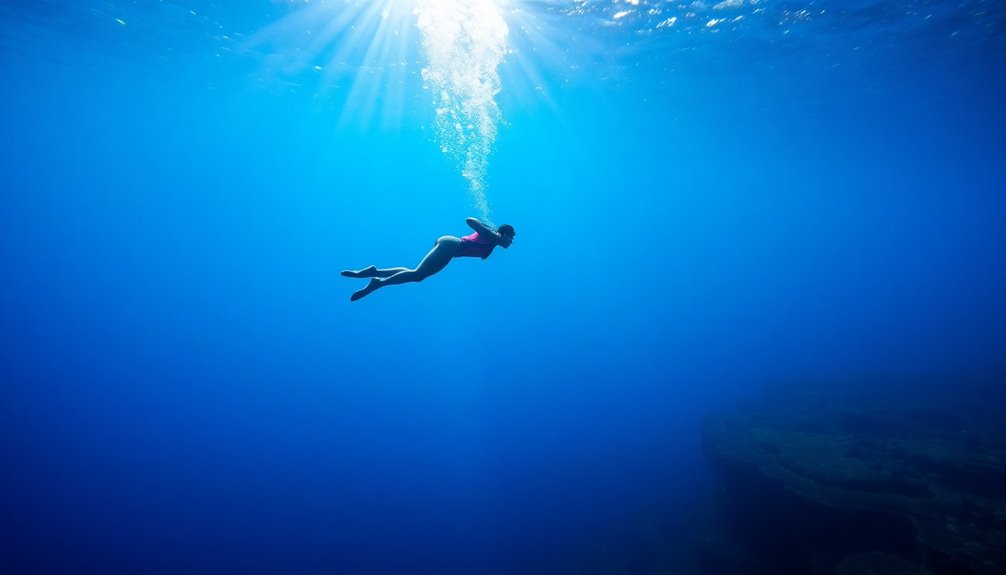
Notable figures in the history of freediving have pushed the boundaries of human potential, each contributing to the sport's evolution.
For instance, Stotti Georghios made history in 1913 by diving 60 meters to retrieve an anchor, even though he faced some tough challenges like lung and ear injuries. This marked one of the early instances of record-keeping in the sport.
Fast forward to the 1950s, and you'll meet Alberto Novelli, a dentist who dived to 41 meters using his medical knowledge and fancy breathing techniques!
Raimondo Bucher and Ennio Falco also made waves in the early days, with Bucher diving 30 meters in 1949 and Falco teaming up with Novelli to set records.
In the 1960s, Enzo Maiorca and Jacques Mayol became legends, with Maiorca reaching 101 meters and Mayol introducing yoga breathing to the sport.
Then there's Tanya Streeter, who set a no-limits record of 160 meters in 2002, while Herbert Nitsch took it even further with a staggering 214 meters in 2007.
These athletes inspire and excite, proving that with courage and determination, anything is possible beneath the waves!
Training for Elite Freedivers
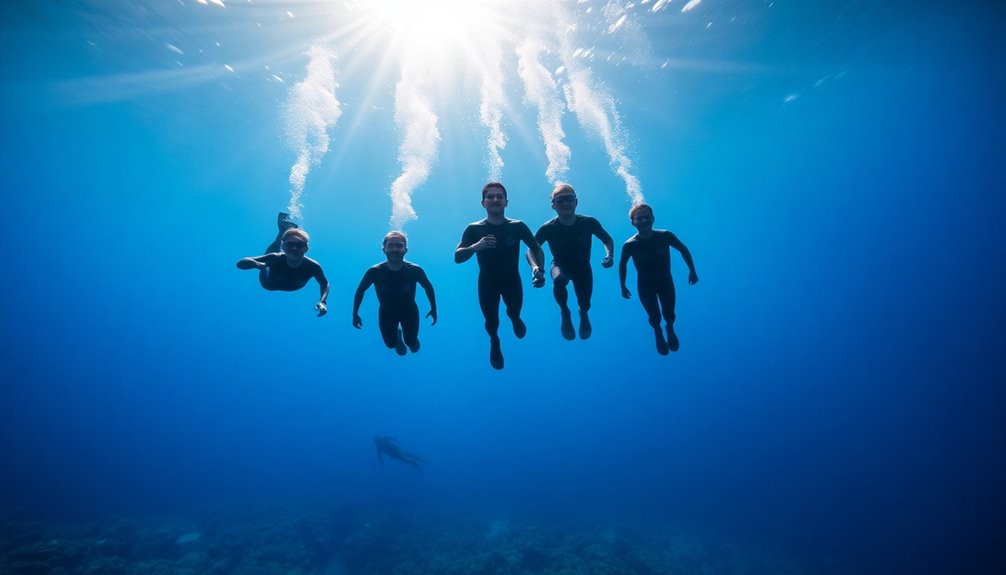
The journey of elite freedivers doesn't end with record-setting depths; it requires rigorous training and preparation.
First, you'll need to master breath control through static and dynamic apnea training. This means you'll float on the surface or swim while holding your breath, making your lungs stronger and your dives longer!
Next, depth training helps you get used to the pressure changes as you dive deeper. It's crucial to practice equalization techniques to prevent barotrauma and ensure a safe descent.
But it's not just about your lungs! Core strength is key, so exercises like planks and leg raises are your best friends.
Don't forget about your legs—squats and lunges will help you kick like a dolphin! You'll also want to work on flexibility, doing stretches or yoga to keep your body limber and ready.
Mental preparation is just as important. Practices like meditation can help you stay calm and focused while diving.
Plus, getting feedback from a buddy or instructor can boost your skills!
Safety Protocols and Risks
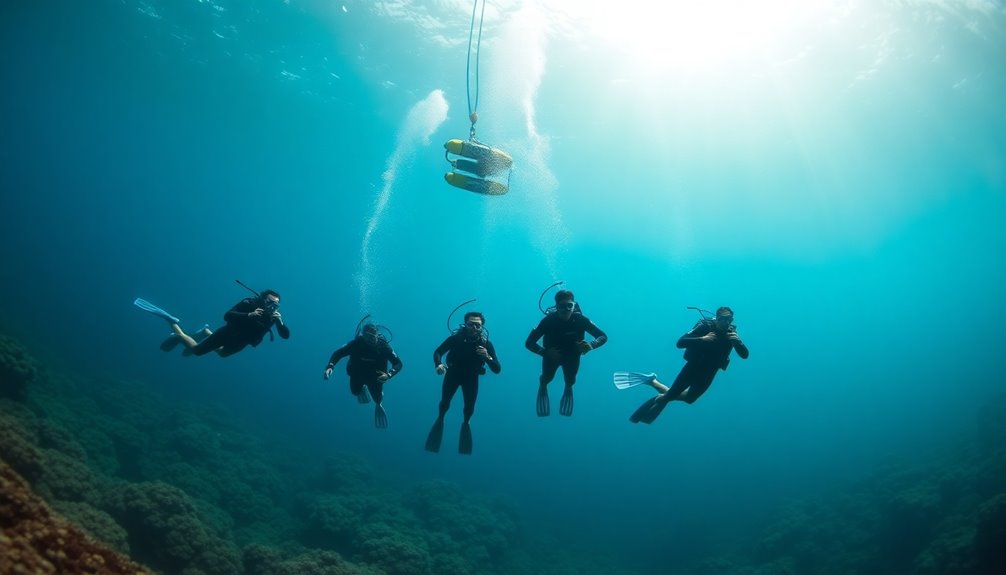
Before you dive into the depths, it's crucial to understand the safety protocols and risks involved in freediving. First off, never dive alone! Always pick a buddy who's familiar with safety and rescue procedures. It's important that your partner can rescue you from at least 15 meters deep. When you dive, one of you should stay up while the other goes down—this way, there's always someone watching out for you.
Before you jump in, create a dive plan. Check the weather, currents, and visibility. Make sure everyone knows the plan, including warm-ups. And remember, don't hyperventilate before diving—it's a big no-no! Using the right gear is super important too! A high-quality wetsuit and a flexible snorkel are essential, and investing in freediving gear can significantly enhance your performance and safety. Avoid full-face masks because they can hold too much air.
Now, let's talk about risks. Don't dive if you're tired or feeling under the weather. If you happen to black out, perform artificial respiration and quickly get the diver out of the water.
Stay safe, follow these protocols, and enjoy exploring the amazing underwater world!
Major Competitions and Events

Freediving competitions offer thrilling challenges that push athletes to their limits, showcasing their incredible skills and endurance. One of the most exciting events is the Caribbean Cup, held annually in beautiful Roatan since 2013. It gathers teams from around the world, creating a festive atmosphere filled with competition and camaraderie. This prestigious event hosts World and Nation Championships from five continents, further elevating its significance in the freediving community.
The AIDA World Championship and the CMAS Freediving World Championship are other major events that attract elite divers. These championships feature various disciplines, like Constant Weight (CWT), where divers use fins to dive deep without touching the line, and Constant Weight Without Fins (CNF), which is super tough since divers must rely only on their bodies.
Vertical Blue is another special competition, often leading up to the big championships, helping athletes fine-tune their skills. In these events, official judges ensure everyone plays fair, and doping controls keep things safe.
With strict rules in place, excitement fills the air as divers strive to break records and achieve personal bests. So, whether it's the thrill of the competition or the beauty of the ocean, freediving events bring out the best in these daring athletes!
Psychological and Physical Challenges

Navigating the depths of freediving presents unique psychological and physical challenges that test an athlete's limits. When you dive deep, self-doubt can creep in, and over 70% of freedivers experience performance anxiety. If you let that inner critic take charge, it can make your dives much harder!
Plus, the pressure to perform can feel like a heavy weight on your shoulders, with 80% of divers saying they feel it too. Fears, like the fear of the unknown or deep water, can pop up, especially as the light fades below. Managing these fears is super important for your safety and well-being! Approximately 85% of freedivers report experiencing mental blocks at various training stages, which can lead to decreased performance.
To tackle these challenges, elite divers often use fun techniques like visualization and deep breathing, which help keep them calm and focused. These techniques not only help them stay calm and focused underwater, but they also assist in regulating their heart rate and conserving oxygen. In high-pressure situations, such as navigating through tight underwater caves or dealing with strong currents, elite divers also rely on specific hand signals and communication codes, like the alpha flag, to effectively convey important information to their dive partners. This level of preparation and communication is crucial for their safety and success during challenging dives.
On the physical side, you'll face increasing water pressure the deeper you go, which can squish your lungs! To prepare, divers work on strengthening their bodies and practicing correct techniques.
Frequently Asked Questions
How Do Freedivers Equalize Pressure During Deep Dives?
When freedivers dive deep, they need to equalize pressure to keep their ears and sinuses comfortable.
You can use techniques like the Frenzel Maneuver, where you pinch your nose and push your tongue up to send air into your ears. It's like magic!
Remember to equalize often, especially in the first part of your dive.
If you practice these techniques on land, you'll be a pro in no time!
What Equipment Do Freedivers Use for Training and Competitions?
When you dive into freediving, you'll need some cool gear for training and competitions!
Long fins help you glide through the water, while a snug mask lets you see clearly. A wetsuit keeps you warm and cozy.
Don't forget a weight belt for quick descents and a buoy for safety!
For competitions, you'll also want a dive line and safety divers watching your back.
With the right gear, you're ready to explore underwater!
How Does One Get Started in Freediving?
To get started in freediving, you'll want to take a course with a certified instructor. This helps you learn important safety rules and techniques.
Always dive with a buddy—it's way more fun and safe! Practice your duck dive technique, and get comfy with your fins and wetsuit.
Remember to relax and breathe properly; it's like floating on a cloud underwater! With practice, you'll be diving like a pro in no time!
Are There Age Restrictions for Competitive Freedivers?
You'll be happy to know there are no strict age restrictions for competitive freedivers!
If you're between 18 and 49, you can compete in the Senior category.
But if you're 50 or older, you can join the Masters categories, which have different age groups.
So whether you're a young adventurer or a seasoned pro, there's a spot for you!
Just remember to stay safe and have fun while diving deep!
What Are the Common Myths About Freediving?
You might think freediving is all about holding your breath for ages or that you need to be super fit, but that's not true!
Many believe hyperventilation helps, but it's actually risky. Also, blackouts aren't scary; they're just your body's way of saving energy.
Plus, it's not just for young folks—people of all ages can dive!
With the right training and gear, you can enjoy the underwater world safely and comfortably!
Conclusion
Freediving is an incredible sport that pushes human limits and takes athletes to amazing depths underwater! From breaking records to training hard, these elite divers face unique challenges while staying safe. They inspire us with their courage and determination, showing that with practice and focus, we can achieve great things too! So, whether you dream of diving deep or just love the ocean, remember that every dive is an adventure waiting to happen! Dive in and explore!



